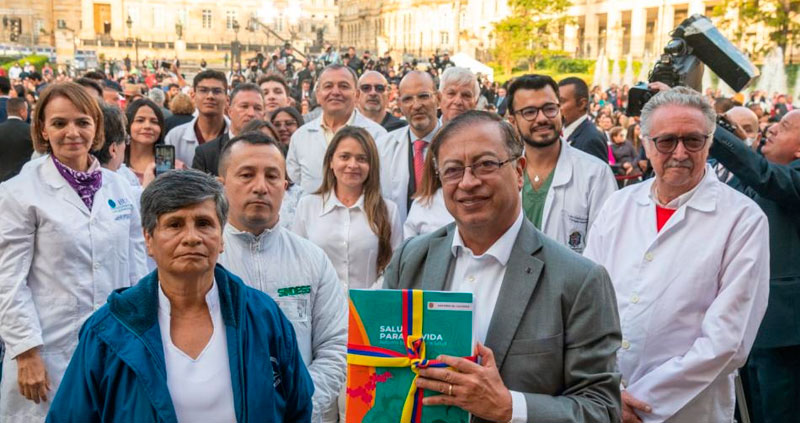Preferring that the Government project ends in two years with the insurance and the EPS and that the views of patients, users, political parties and unions are not taken into account in the presentation, the Colombian Association of Comprehensive Medicine Companies, ACEMI, He sent his objections and objections to the Health Reform to the Congress of the Republic.
Paula Acosta, executive president of Acemi, which joins the EPS, indicated that after a technical and detailed analysis of the health reform paper filed before Congress by the National Government on Friday, March 31, she concluded that the initiative constitutes a serious setback in the right to health of Colombians.
Among the main concerns, sent to the Congress of the Republic, the following were highlighted:
•The project does not resolve the complaints repeatedly raised by users and patients of opportunity in care, nor does it deal with the problems of financial sustainability of the Health System. By dividing the levels of care, and without a person responsible for comprehensive health and financial risk management, it is to be expected that the two problems will worsen.
• The initial proposal of the Ministry of Health to eliminate the insurance model, establish a universal public payer, eliminate the EPS, assign people to Primary Care Centers (CAP) and fragment the benefit is maintained.
• The free choice of the insurer is eliminated. By creating a state monopoly, the possibility for affiliates to choose their insurer is eliminated. The choice of a treating physician or a service center is a limited conception of this right.
• The elimination of the insurance assumes that the financial risk is assumed by the member. Since there is no longer EPS, Colombian households will have to finance additional or unexpected charges.
• The figure of Health and Life Managers does not solve a structural problem: there is no agent with the capabilities to carry out comprehensive management of health risk and financial risk, with which the country’s health results in the medium term, the sustainability of the system and the advances in equity —including low out-of-pocket spending— are seriously compromised and there would be a fiscal risk for the Nation.
•Financial fragmentation through different funds and accounts hinders operational and administrative management. The participation of the different Funds in the total resources managed is not specified, in such a way that it is not understood how they will be distributed. The nature of account funds does not change the approach or the risk of bureaucratization: Fosyga was a fund with more than 400 employees.
• The inability of ADRES to assume functions such as the medical audit of all care in the country is worrying. The new functions regarding charges for SOAT care are a clear example of this lack of capacity. To date, the providers (clinics and hospitals) have not been able to file the first invoice since the entry into force of the regulation, in December 2022.
•The constitution of a limited fund of resources implies that the affiliates who access first leave those who arrive later without attention. This can happen especially in high-cost patients. The presentation reduces $11 billion annually for health services, since it indicates that 87% of SGP resources must be allocated to primary care, redirecting resources that today finance higher levels of complexity.
•Triple vertical integration: the State defines the policy, regulates it, defines rates, contracts, provides services, audits, pays and monitors. The Ministry of Health assumes operational functions, Agencies such as ADRES assume regulatory powers, which is a setback in institutional design.
•The proposed transition is not viable in terms of time or resources. The close to 100,000 jobs that may be lost are worrying, as well as the continuity and financing of care for the 8 million Colombians with chronic and high-cost diseases.
•The presentation did not elaborate a rigorous and comprehensive analysis of the projects presented for accumulation. Although some articles from other initiatives are added, it does not respond to a conceptual exercise of building a coherent, technical and concerted article.
On the other hand, ACEMI shares several points of the presentation, among which are:
• Health promotion and disease prevention within the framework of an insurance system and with a focus on social determinants.
• Strengthening of Primary Health Care, accompanied by differential care models for dispersed and remote areas.
• Strengthening of the health talent policy.
• Improvement of infrastructure and equipment in the health sector.
• Improvement in the ways of contracting health personnel.
• Promotion of national production of medicines, supplies and vaccines.
• Creation of a social health system with its own financing.
The union reiterates the willingness of the EPS to contribute to the Government’s objectives from the capacities built, and reiterates its concerns about the future of the Health System if the paper presented is approved. These observations have been shared with the seventh commissions through a communication filed on April 10 before Congress.
Con RSF
